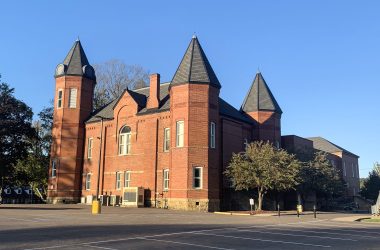Acts 9:10-20
The book of Acts is the history of the early church. The human author, Luke, was moved by the Holy Spirit to include accounts of the happenings which shaped the church’s development. Acts 9:10-20 focuses upon a happening which resulted in the transformation of Saul from persecutor of the church to Saul, a preacher of Christ.
On the Damascus road, the Lord Jesus Christ told Saul to go into the city and he would be told what to do (v. 6). The future things which Saul (Paul) was told to do, he did. The Lord would speak directly to Paul and he would become the Apostle to the Gentiles.
In verse 10, the Lord spoke to Ananias in a vision which is related to us in verses 11 through 16. In the vision, the Lord instructed Ananias to go to specific house on a specific street and to inquire for Saul of Tarsus. The Lord then told Ananias the reason that he was to seek Saul. Saul had prayed and the Lord had revealed to him (Saul) in a vision that a man named Ananias would come to him and place his hand upon him such that he might receive his sight.
In Ananias’ vision, Ananias witnessed his own reply to the Lord. Ananias testified that he had heard evil things concerning Saul — that he had heard of the many Christians that Saul had imprisoned and of the authority given to Saul to arrest Christians.
Still in the vision, the Lord told Ananias that Saul was a chosen vessel to bear His name to the Gentiles, kings, and the children of Israel. The Lord also told Ananias that Saul would suffer great things for His name’s sake.
Ananias did as he was instructed. He went to the house and placed his hands upon Saul and explained why he had come. Paul (Saul) would later carry the gospel of Jesus Christ to many Jews and Gentiles.
There is only one Apostle Paul. Paul was greatly used by the Lord. He brought the gospel of Jesus Christ to Europe and he authored 13 New Testament epistles.
The text before us reveals the role of Ananias in paving Paul’s path. The Lord spoke to Ananias in a vision. Ananias heard the Lord call out his name and he responded. His response, “Behold, I am here, Lord”, projects a willingness to listen and a willingness to do. Ananias did not know what the Lord would ask of him or instruct him to do. There are no pre-conditions found in “Behold, I am here, Lord”. One cannot say these words unless one fully trusts the Lord.
Ananias was ready to respond to whatever the Lord might ask. Ananias was powered by faith. He was ready to put God first. One becomes ready to put God first by letting God make it happen. Ananias was “a devout man according to the law” (Acts 22:12). Ananias trusted God. His trust resulted in faith and his faith produced works — devoutness.
While verses 13 and 14 may be viewed as Ananias questioning the Lord’s instruction to go to Saul and to place his hands upon him, the Holy Spirit uses this scripture to reveal the character of the Lord God. In these verses, Ananias is not informing the Lord concerning Saul; Ananias is informing us that he knows of Saul’s evil past. The Lord, in His response to Ananias’ concerns, stated that Saul was His chosen vessel “to bear my name before the Gentiles” (v. 15). Saul’s evil past was of no account. The past is past. It did not count against Saul and the past was to be of no concern to Ananias. Saul was a new creature in Christ. Ananias was called to accept Saul as the Lord accepted him. We, like Christ, are to regard our brothers and sisters as new creatures in Him. We know that Saul’s past was of no account to Ananias because he went his way and entered the house and placed his hands upon Saul and addressed him as “brother Saul” (v. 17).
Verse 17 additionally records the words which Ananias spoke to Saul. He told him that the Lord Jesus who appeared to him on the Damascus road had sent him such that he might receive his sight and be filled with the Holy Ghost. Ananias’ words were faith-building words because that which Christ revealed to Saul in vision, Ananias delivered in person. Saul came to know Christ on the road to Damascus as a giver of promises but through Ananias, he came to know the Lord as a keeper of promises.
Because Ananias did what he did, Saul’s eyes were opened and he was baptized. Saul preached in the synagogues that Jesus is the Son of God.
Saul was chosen by God to be the Apostle to the Gentiles. God the Son used Ananias to make it happen.
All New Testament believers are called. Some are called to declare Christ and Him crucified and risen as Paul (Saul) did. Others are called to be instruments that the Lord uses to build faith in others as Ananias was used. All believers are called to be new creatures in Christ and to walk anew, leaving the evil of past things past. Let us so walk.



